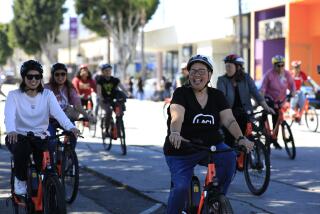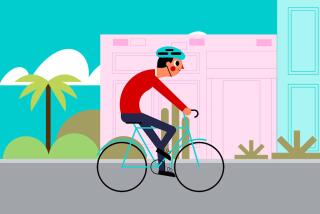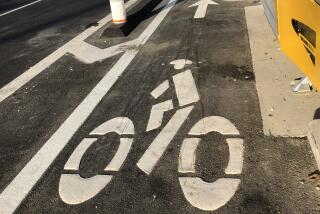In L.A., slow and steady is the pace for Flying Pigeon bicycle
- Share via
They’re heavy and slow. They’re also touted as the most popular mechanized vehicle on earth.
“You’re not going to go racing on a Flying Pigeon,” explained Josef Bray-Ali. “You’re going to go shopping.”
Bray-Ali and his brother, Adam, own the Flying Pigeon LA bicycle shop in Cypress Park, where their specialty is the Flying Pigeon brand bike.
The clunky two-wheeler, with its old-school fenders and chain guard, is used by millions of Chinese as their basic transportation. The bicycle is so ubiquitous that it is considered a cultural icon there. In the 1970s, the Chinese government defined prosperity as “a Flying Pigeon in every household.”
But the Flying Pigeon was virtually unknown in the United States until the Bray-Ali brothers imported two containers of them four years ago and opened their bike shop.
“Ninety-five percent of bikes in this country come from China, but you couldn’t find a Flying Pigeon here,” said Josef.
When the brothers unloaded the 870 unassembled bikes, they were overwhelmed.
“It was a definite gut-check moment,” said Adam. “I asked myself, ‘Why did we do this?’”
In an age when serious cyclists spend thousands on ultra-light carbon-fiber bikes that sport caliper brakes and as many as 27 derailleur-run gears, the Flying Pigeon has one gear and old-fashioned rod-operated brakes.
The steel-frame bicycle is a hefty 50 pounds, more than three times the weight of a typical racing bike.
“These are Chinese sewer pipes. They’re very tough,” joked Josef. “They’re built to last a lifetime.”
Characterized as utilitarian city bikes, Flying Pigeons are not for climbing hills or getting somewhere fast. Their top speed is about 12 mph, and reaching that speed from a standing stop requires heavy pedal-pushing.
The brothers say there are now about 250 Flying Pigeons on Los Angeles streets. Several hundred others have been sold to riders elsewhere.
“We’re down to our last 300 Flying Pigeons,” said Josef. “Next time, we’ll only order 250 or 300 at a time from the factory.”
Flying Pigeon was the only brand the pair initially sold; they now stock 10 other brands of European-style city bikes and larger two-wheel cargo carriers. There’s a “small but growing demand” for them, they say.
The Flying Pigeon draws double takes from Chinese immigrants when Adam rides his in the San Gabriel Valley and in Chinatown.
“Elderly Chinese will say, ‘We certainly haven’t seen one of these in a while,’” said Adam, 38, an Alhambra resident whose day job is selling residential real estate. “They look at it as a blast from the past.”
Though the duo says Flying Pigeons are designed for daily use, one of their first customers displays his in his living room.
“I’ve probably only put two miles on it,” said Martin Mitchell, a Streetsboro, Ohio, business process analyst who bought his bike in 2008. “I bought the Flying Pigeon as an object of art. At Christmas I roll it over by the Christmas tree and put a large red bow on it.”
Josef, who is 33 and lives in Lincoln Heights, runs the shop on a day-to-day basis. He sells the Flying Pigeon for $399 fully assembled and online for $199 unassembled.
He’ll probably be pedaling a Flying Pigeon on Sunday when he and his brother lead a monthly “dim sum run” to a Chinese restaurant in Alhambra. That ride begins at 10 a.m. at the bike shop at 3404 N. Figueroa St.
“We’ll be taking the Metro Gold Line train to Pasadena and then taking a new bike path to Alhambra,” he said.
“We won’t be breaking a sweat. It’s downhill.”
More to Read
Sign up for Essential California
The most important California stories and recommendations in your inbox every morning.
You may occasionally receive promotional content from the Los Angeles Times.














